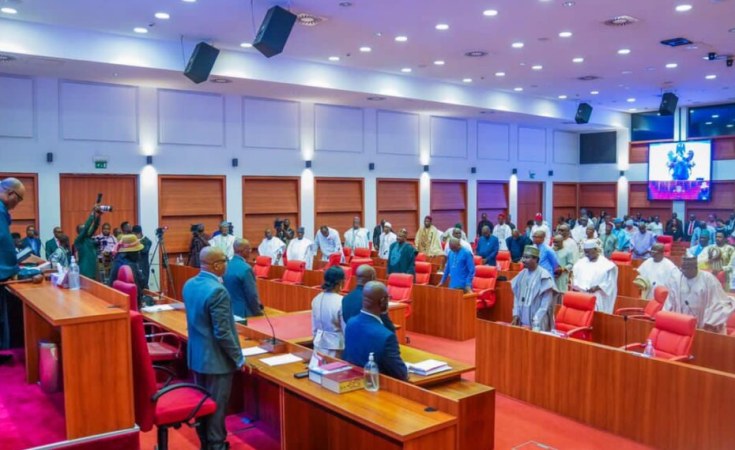The bill seeks to address the prolonged conflict between farmers and herders.
A bill seeking to ban open grazing and establish ranches for herders in the country has passed a second reading at the Senate.
The bill was passed on Wednesday during the plenary after a majority of the senators supported it when the Senate President, Godswill Akpabio, put it to vote.
It is titled "A Bill for an Act to Establish National Animal Husbandry and Ranches Commission for the Regulation, Management, Preservation and Control of Ranches throughout Nigeria; and for connected purpose, 2024."
The bill was sponsored by Titus Zam (APC, Benue North-west).
The senate president, thereafter, referred it to the Committees on Agriculture, Trade and Investment; and Judiciary and Legal Matters.
He directed the committees to report to the Senate in one month.
Motion
Mr Zam, while leading the debate on the bill, stressed that, If passed, it will proffer a solution to the age-long farmer-herder crisis.
He argued that the best solution to the farmer-herder clashes was to establish legislation that would prohibit open grazing and the creation of ranches for herders to graze their cattle.
The senator lamented the continuous crisis between farmers and herders and how it had led to loss of lives and properties.
Mr Zam said over five million people have been displaced, while the clashes have caused Nigeria $3.5 million or 47 per cent of its Internally Generated Revenue.
He warned that if the conflict is not addressed soon, the consequences will be more severe than the civil war.
"It is old-fashioned, hazardous and must be stopped," Mr Zam said.
Debate
While majority of the senators supported the bill, several others, including the senate president, opposed the provision that ranches should only be established in the herders' state of origin, which stirred a heated debate.
Enyinnaya Abaribe (APGA, Abia South), who supported the bill, identified the farmer-herder clashes as the major reason for food insecurity in the country.
He also asked the parliament to review the law that empowered states to take ownership of land.
Danjuma Goje (APC, Gombe Central) disagreed with the provision of the bill that ranches should only be established in states with pastoralist communities.
"We should be managmous enough, not to confine them. That will not solve the problem. These people are Nigerians and don't benefit from anything, they don't benefit from school, hospitals, nothing," he said.
Adamu Aliero (PDP, Kebbi Central) raised a point of order, citing the 1999 Constitution that every citizen has the right to move without any hindrance.
Kawu Sumaila (NNPP, Kano South) disagreed with the bill, claiming that it will worsen herders farmers crisis.
"Lets come up with something more comprehensive that protects the interest of all parties . There are so many reasons why herders go against farmers that we should look at. It is contrary to the constitution and we will fight it to the end," Mr Sumaila said.
The Deputy Senate President, Barau Jibrin, recommended that the bill should be stepped down for wider consultations and proper information.
Mr Zam, however, disagreed with the position that the bill should be stepped down.
In his remarks, Mr Akpabio agreed that the upper chamber may review the Land Use Act to allow for easy access to lands.
The senate president also said the bill, if passed, will be a national law that should be binding on all states.


